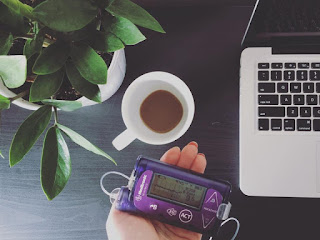Recently someone I know from high school was diagnosed with type 1 diabetes. It brought back that feeling of when I was first diagnosed in 2009, just after high school. I have since connected with her trying to give some insight of what I've learned in the past eight years, and bring myself back to that moment when I first heard those words,
"you have type 1 diabetes."
When I was diagnosed I connected with someone else who had diabetes within the first few weeks. This to me was key, because when you are first diagnosed you have no idea what you're getting into and it is hard to imagine how living with diabetes is at all manageable. Now, not everyone will get that experience of one-on-one meetings with another type 1 right off the bat, but I do hope that eventually a connection is made in their local community. Just in case, I have created a short list of things I think are important to note and remember when first being diagnosed with diabetes.
1. Insulin will not make everything perfect, but you will feel a lot better. I think I was under the impression that as soon as I took my 'medicine' that everything would be good and I would just feeling perfect and go about my normal routine. Insulin is amazing, obviously, but diabetes is like a puzzle and it requires a lot of figuring out, ratios, timing, brain power and a magic wand. It can be really disappointing when you first go on insulin and you are still dealing with the stubborn highs of diabetes. I can remember bawling my eyes out thinking I was doing something wrong because I was taking my medicine but nothing was immediately happening.
2. Your story is my story. There is power in sharing your story with others and if you do not know anyone in your community, check with your local hospital or go online! There are so many resources online of people to chat with or blogs to read. I can remember when I was meeting another type 1 for the first time, and she told me about her symptoms pre diabetes, I felt like she was telling my story and in that I felt comfort. I wasn't struggling alone, and someone knew exactly how I felt.
3. You can cry, but be sure to end with a positive note. I have cried a lot about my diabetes. When I was first diagnosed I would break down about the unknown future, would my hands become gapping holes after all these pokes? Would I be able to have a baby? Would I live as long as my friends? All of these questions flooded my mind and I would literally break down. I think this is just us being humans, we deal with things differently, and there is nothing wrong with crying. But, be sure to remind yourself of how far you've come, and prove to yourself what you can STILL do! I often would cry and find myself in a deep dark hole of 'why me!' and as time has gone by, I have realized the answer to, why me?
4. All this structure will eventually become your routine. No one is a perfect diabetic, and if someone claims to be, here is your gold star. When I was first diagnosed I did everything to the book. I counted individual french fries, I changed my lancet every single time, and I never once left the house without my bag of supplies. All of this, which every doctor, dietician and nurse would praise, eventually adapts to how you decide to live your life with diabetes. You become an expert of carb counting via eye-balling and you 'joke' about only changing your lancet every few months... Diabetes is 24/7 and you have a million other things going on, at first it seems impossible to fit it all in and to follow the guidelines and rule book, but you'll adapt and find ways that make sense for you.
Kayla
 After leaving HealtheVoices last weekend, I am left thinking about all of the people that put in so much work and effort into advocacy and support. Running a Facebook group, blog, support group, and other diabetes-endeavorers, myself, I know that this work is hard and it's never ending and after spending time with people who put in the time day in and day out, I have come to realize how much passion and motivation comes from truly believing in the power of your own voice.
After leaving HealtheVoices last weekend, I am left thinking about all of the people that put in so much work and effort into advocacy and support. Running a Facebook group, blog, support group, and other diabetes-endeavorers, myself, I know that this work is hard and it's never ending and after spending time with people who put in the time day in and day out, I have come to realize how much passion and motivation comes from truly believing in the power of your own voice.




